Herman J. Zeuch, a banker from Davenport, Iowa, is a historical figure who played an instrumental role in the establishment and development of Vero Beach, Florida. His leadership and vision through the Indian River Farms Company transformed what was once swampland into a thriving agricultural and residential community. Zeuch’s contributions to the area’s growth and urbanization have left an indelible mark on its history.
In 1912, Zeuch and his partners purchased 55,000 acres of land on Florida’s east coast. At the time, this land was largely uninhabitable, characterized by marshes and sawgrass. Zeuch envisioned a transformation—draining the swamps and creating fertile farmland to sustain citrus groves and truck farming. He was inspired to develop this land into a flourishing agricultural community that would attract settlers escaping harsh northern winters.
Zeuch’s innovative drainage system, designed to withstand Florida’s unpredictable weather, was critical to the project’s success. By 1915, the network of canals had effectively reclaimed the land, enabling farming and human settlement. Unlike similar projects in Fellsmere, which suffered setbacks due to heavy rains, Zeuch’s system held strong, proving the effectiveness of his approach.
The reclaimed land was marketed aggressively, with advertisements in northern newspapers touting the area’s potential as a year-round farming haven. Promotional materials emphasized the warm climate, fertile soil, and opportunities for prosperity. In 1913, the Indian River Farms Company laid out the original plat for the “Town of Vero.” The town was incorporated in 1919 and later renamed Vero Beach in 1925 when it became the seat of the newly created Indian River County.
--> Join the conversation in Vero Beach Foodie and 46,600 very active members right now! <--
--> Subscribe to our weekly email and discover all the local events and happenings around the town. Join 26,650 of your neighbors right now! <--
Zeuch’s leadership extended beyond land development. He spearheaded the “City Beautiful Campaign” in 1915, encouraging residents to beautify their properties and public spaces. The campaign’s influence is still evident today in Vero Beach’s charming historic neighborhoods and well-maintained landscapes.
Zeuch’s vision extended beyond agriculture. Recognizing the importance of infrastructure, he supported the construction of roads, bridges, and public buildings that laid the foundation for modern Vero Beach. The first wooden bridge across the Indian River Lagoon, completed in 1919, connected the mainland to the barrier island, opening new opportunities for growth and development.
Zeuch also understood the value of community. The Indian River Farms Company built a hotel, the Sleepy Eye Lodge, to accommodate visiting land buyers, and helped establish schools, churches, and businesses that fostered a sense of belonging among the early settlers.
Zeuch’s work with the Indian River Farms Company was instrumental in shaping Vero Beach into the vibrant community it is today. The town’s success as a hub for agriculture, particularly Indian River citrus, can be directly attributed to the reclamation and drainage systems he implemented. Beyond agriculture, his vision for urban development helped transform Vero Beach into a modern city while preserving its natural beauty and historical character.
Herman J. Zeuch’s story is one of ambition, innovation, and resilience. From envisioning a thriving community in Florida’s wilderness to overseeing its transformation, his contributions have ensured that Vero Beach remains a cornerstone of Indian River County’s history.
Sources:
- “Historic Preservation – A Brief History.” City of Vero Beach. Link
- Gould, Janie. Century of Progress. Indian River Magazine. Link
- Richardson-Sloane Special Collections Center Blog. “Davenporters of Note: Herman J. Zeuch and the Indian River Farms Company.” Link
- Time is Running Out—French Moderns: Monet to Matisse, 1850–1950 Exhibition at the Vero Beach Museum of Art, only through June 22 - May 30, 2025
- Celebrate National Get Outdoors Day and Father’s Day Weekend with Free Admission at the Environmental Learning Center - May 30, 2025
- Top 9 Late Night Foodie Spots in Indian River County - May 28, 2025

